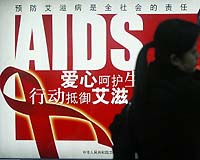| . |  |
. |
Johannesburg (AFP) Nov 30, 2009 While South Africa's HIV infection rate may have stabilised experts warn that the country's slow AIDS response has triggered a time bomb that may leave one in three children orphaned. "Estimates show that by 2015, some 5,700,000 or 32 percent of all children in South Africa would have lost one or both parents due to HIV/AIDS," said Gail Eddy, a researcher at the Institute of Race Relations, told AFP. In 2008 there were 1.5 million AIDS orphans according to the country's health department. She said as the epidemic continues to shorten the lives of parents more children were going to be orphaned and the number of child-headed households would also increase. The government currently provides support to about 238,000 AIDS orphans and to more than 20,000 homes where older children care for younger siblings after their parents die from the virus. Eddy said orphans needed additional support that was not necessarily monetary in nature as these children had also lost their primary caregiver. "What exacerbates the lack of support for these children, is that South Africa has a shortage of social workers who are responsible for identifying vulnerable children and providing them with the necessary support," she said. Nearly 495,000 AIDS orphans are in foster care, but the government is encouraging more adoptions so orphans can have permanent families. But only a tiny fraction of the AIDS orphans, about 1,900, were adopted by South Africans last year, a drop of nearly 13 percent from the previous year. "If the status quo is maintained, South Africa will be faced with a major crisis in the future, due to the social and economic consequences of increasing numbers of orphans and child-headed households," said Eddy. A recent study by Harvard School of Public Health study said the failure to provide anti-retroviral drugs (ARVs) to AIDS patients in South Africa led to the premature deaths of 365,000 people between 2000-2005. UNAIDS estimates indicate that 5.7 million out of nearly 48 million South Africans are living with HIV, up from 5.5 million in 2005. That puts South Africa in first place for the number infected, but only about a million people are getting the cocktail of ARVs that prevent people with HIV from developing fullblown AIDS and extends their lifetimes. Activists and the current government lay the blame for the rapid spread of the disease squarely on former president Thabo Mbeki's policies as he delayed the roll out ARVs, questioning the link between HIV and AIDS. His infamous health minister Manto Tshabalala-Msimang, promoted the use of lemon juice, garlic and beetroot above ARVs, which she said were toxic. Gail Johnson, founder of NKosi's Haven, a shelter for 100 HIV-infected mothers and their 183 children, said South Africa lost valuable time due to the delays by Mbeki's government to roll out the much needed ARVs. "We became arrogant and recommended beetroot and garlic, people died," said Johnson. The leader of the young Communist Party, which is the alliance partner of the ruling African National Congress (ANC), last week made headlines when he called for Mbeki to be charged with genocide for their denial about the existence of the virus. In stark contrast to his predecessor, Zuma will be taking in public a HIV test on World Aids Day on Tuesday, although his results won't be disclosed. Dr William Mapham, Wits university Reproductive Health and HIV Research unit spokesman says there has been a policy shift in government's response towards the epidemic. "There is no denialism anymore, Zuma came in and changed a few things and it's definitely going to have a positive effect on South Africa," he said. Share This Article With Planet Earth
Related Links Epidemics on Earth - Bird Flu, HIV/AIDS, Ebola
 Yao Ming in campaign to fight HIV stigma in China: UN
Yao Ming in campaign to fight HIV stigma in China: UNBeijing (AFP) Nov 27, 2009 UNAIDS said Friday it had launched a campaign to address rampant discrimination against people living with HIV in China, with the help of Chinese NBA megastar Yao Ming. The campaign, launched with China's health ministry, will see posters and videos of Yao and his fans, including some with HIV, displayed on giant screens in 12 cities across China, the United Nations agency said in a ... read more |
|
| The content herein, unless otherwise known to be public domain, are Copyright 1995-2009 - SpaceDaily. AFP and UPI Wire Stories are copyright Agence France-Presse and United Press International. ESA Portal Reports are copyright European Space Agency. All NASA sourced material is public domain. Additional copyrights may apply in whole or part to other bona fide parties. Advertising does not imply endorsement,agreement or approval of any opinions, statements or information provided by SpaceDaily on any Web page published or hosted by SpaceDaily. Privacy Statement |